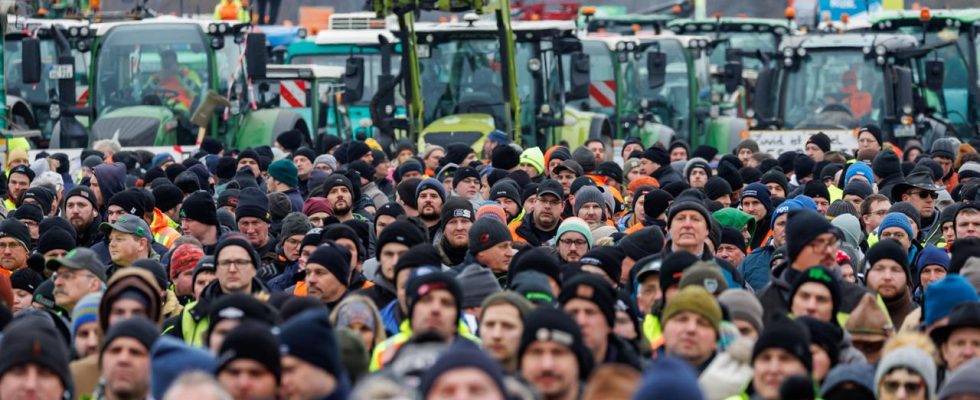On the fifth day of farmers’ protests, road blockades broke out again across the country. Thousands of farmers were on the move with tractors. The AWO filed a complaint about an Elbe bridge that was blocked on Monday.
Farmers’ protests continue. Farmers once again took to the streets in many parts of the country, and in some cases there were blockades and traffic restrictions. According to the police, 5,000 protesters with around 2,500 tractors and agricultural machinery gathered in Nuremberg to demonstrate against the federal agricultural policy.
Protests also took place in the north. In Schleswig-Holstein, thousands of farmers came together in Kiel after a rally of 16 registered tractor convoys from the Plön and Rendsburg-Eckernförde districts. In the state capital, they took part in a protest trip with at least 3,100 tractors and other vehicles, a police spokeswoman said. This caused traffic to almost come to a standstill. Afterwards there was a rally on the parade ground in Kiel.
Traffic disruptions through protests
There were also traffic disruptions in Brandenburg. In several places, farmers demonstrated with their vehicles and blocked roads. In the south of Berlin, the federal highway 101 had to be temporarily closed in both directions due to a demonstration. A total of around 40 protest actions were registered in Brandenburg, including on the A24 and A19 and in the direction of Poland.
In Saxony-Anhalt, numerous motorway entrances were blocked. Protest events were also reported in Baden-Württemberg, Bremen, Hesse, Lower Saxony, North Rhine-Westphalia, Mecklenburg-Western Pomerania, Rhineland-Palatinate, Saarland, Saxony and Thuringia. In many federal states there will also be isolated actions on weekends.
Clinic files a complaint about the blockage
Meanwhile, the state board of the Workers’ Welfare Association (AWO) filed a complaint about a previous blockade. The closures of the Elbe bridge near Tangermünde in the Stendal district (Saxony-Anhalt) were not announced on Monday and Tuesday, according to the managing director of the AWO Jerichow Hospital, Thomas Wendler. Nurses and doctors were not allowed through. Of around 180 workers, around 30 did not come to work, which also had an impact on patient care.
The clinic’s managing director described the blocking of the bridge as disproportionate. It is a bottleneck and can hardly be avoided. He also criticized the police for not breaking up the unannounced blockade.
Farmers announce major demonstration in Berlin
The German Farmers’ Association is planning a large demonstration in front of the Brandenburg Gate in Berlin on Monday, which is why thousands of farmers are expected in the capital. The first farmers have already arrived. Dozens of agricultural vehicles are already parked between the Brandenburg Gate and the Tiergarten Soviet Memorial.
Around 5,000 tractors and other agricultural machinery from all over Germany are expected to be on their way to the rally at the Brandenburg Gate, the police said. Several sectors such as fishing and transport joined the protest call. The Dehoga restaurant association is also there.
“It should be made clear to politicians once again what it means to put the competitiveness and existence of farmers and medium-sized transport companies at risk,” said the farmers’ association. Finance Minister and FDP leader Christian Lindner also wants to speak to the protesters. On the sidelines of the event, the leaders of the traffic light factions also want to meet with the farmers’ associations.
Traffic light coalition wants cuts in the agricultural sector
Over the next week, the traffic light coalition in the Bundestag wants to finalize the final details of the 2024 budget, which provides for cuts in the agricultural sector. The farmers’ protests were sparked by an agreement by the federal government that, among other things, provided for the abolition of vehicle tax exemptions and diesel subsidies for farmers. The federal government later withdrew the end of the tax exemption. The diesel subsidy is to be phased out gradually by 2026.
The farmers’ association insists on the long-term continuation of the diesel subsidy. Since the beginning of the week, farmers across the country have been demonstrating with tractor convoys and blockades against the subsidy cuts and against the federal government. The Bavarian Farmers’ Association has already indicated that the protests will intensify. “We have so far refrained from blocking infrastructure, such as the food supply,” it said.
However, the federal government is not promising farmers any further concessions. There are no longer any changes to the planned subsidy cuts, said government spokeswoman Christiane Hoffmann. The government has made its proposal. The protests are being taken very seriously and there are also good discussions with farmers.
Özdemir calls for common solutions
Agriculture Minister Cem Özdemir (Greens) meanwhile referred to the failures of the previous Union-led governments and called on traffic light and Union parties to find common solutions for agriculture. The political center must shape an “agricultural policy with broad majorities,” said Özdemir in ZDF’s “Morgenmagazin”.
It was not just the planned cuts in agricultural subsidies that triggered farmers’ anger, but also the fact that “for decades, farmers were promised things by changing governments that were only partially kept or not kept at all.”
Özdemir has done “what I can” since he took office around two years ago. He listed the state animal husbandry label, a change in the building code and the pollution control law, which are intended to make it easier to build and convert animal-friendly stables. He has “mobilized a billion euros just for pig farmers”. But “now I’m getting to the point where I can’t go any further on my own.” What is needed is the consensus of the “traffic light” but also of the “largest opposition party”.

